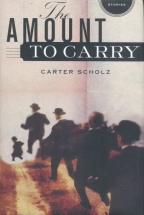The Amount to Carry
Carter Scholz
Picador / St. Martin's Press
US Hardcover First
ISBN 0-312-26901-3
Publication Date: 02-11-2003
208 Pages; $23.00
Date Reviewed: 03-05-03
Reviewed by Rick Kleffel © 2003

REFERENCES
COLUMNS
|
|
|
The Amount to CarryCarter ScholzPicador / St. Martin's PressUS Hardcover FirstISBN 0-312-26901-3Publication Date: 02-11-2003208 Pages; $23.00Date Reviewed: 03-05-03Reviewed by Rick Kleffel © 2003 |
|
|
REFERENCES |
COLUMNS |
Fiction is supposed to have no boundaries. The page is blank before the writer sets pen to paper, before the fingers grace the keyboard. For Carter Scholz the page is not merely empty, it's theoretical. Every word is an experiment, and the word that follows is almost certain to take the willing reader in a direction that nobody would have hitherto thought to exist. His novel 'Radiance' dissected the intersection where science meets the military and found an unsuspected universe where bureaucracy builds on its own exaggerations until the entire edifice threatens to collapse in upon itself. As a short story writer, Scholz is no less unpredictable. The stories in 'The Amount to Carry' cannot be categorized, only collected. Put them all in the same volume, line them up one after another, number the pages and offer a table of contents. That's about as much can be done to get them before the reading public, and it's a heroic effort. This collection starts out of bounds and journeys simultaneously inward to the heart of fiction and outward to the edge of what can be known. Resistance is futile; your expectations will be annihilated.
The variety of affect in this collection is such that no two stories have even a remotely similar vibe, other than the overweening strangeness and erudition that Scholz brings to the table. As a prose stylist, he is incredibly versatile. He can offer a slice of backdated modern angst such as 'The Eve of the Last Apollo', a closely observed story of loss in the late 1970's with the simple clarity of Raymond Carver. One of the most remarkable stories is 'A Catatrophe Machine', which combines some of the humorous effects of the best R. A. Lafferty stories with the intellectual rigor of Stanislaw Lem. The science fictional explosion of understanding comes a bit early in the story, and leaves the finale lacking, but the explosion is worthy of the best that Clarke or Asimov ever conjured. Any reader who has ever felt or desired a personal connection to the world around them -- and this is just about everybody, is it not? -- will find this story a powerful rendition of recent history from the 1960's to the present.
Scholz performs science fictional experiments in arenas that other writers of science fiction or literary experimentation never really imagine. Scholz is willing to impose science fictional experiments on prose and the storytelling form itself. In 'At the Shore' he studies the grains of understanding on edge of fiction and quantum theory, in the frame of a very cleverly conceived story about a man accelerated to the speed of light. It's the kind of science fiction story that has the reader wondering why nobody else ever thought of the questions posed in the narrative. 'A Draft of Canto CI' is the kind of hallucinatory prose poem one might have hoped for from Ezra Pound had he done a stint in the world of 'Amazing Stories'. 'The Nine Billion Names of God' is a standout piece of experimentation that will have veteran readers of science fiction magazines howling with laughter and crying at the truth contained within the narrative. 'Invisible Ink' offers up in rhyming prose a look at the mechanics of publishing. Try -- just try -- to refrain from reading it aloud.
Scholz even offers narratives that verge on traditional storytelling, though the stories he tells are anything but traditional. 'Altamira' is a poignant look at creativity lost and found that would have made a memorable addition to 'The Twilight Zone'. 'Travels' finds Marco Polo's soul encountering a nearly omnipotent computer at the edge of the galaxy, and lets Scholz run loose through tales of storytelling. 'Mengele's Jew' find the man of the title contemplating his own version of the "Schroedinger's Cat" thought experiment after an encounter with Heisenberg. 'The Amount To Carry', from 'Kafka Americana', imagines a meeting between Kafka, Charles Ives and Wallace Stevens at a business conference. Each story offers characters confronting the actual importance of mathematics on the lives of living, breathing human beings.
'The Amount to Carry' covers a lot of range in a small number of pages and should absolutely thrill those who think that science fiction is an appropriate genre for exploring literary ideas with unfettered freedom. It will shock those who love literature and find that every single story, with one exception, first found publication in genre magazines, not literary journals. Most of these stories read like the occasional genre-tinged material that finds publication in the highest-prestige and most influential literary magazines -- The Atlantic Monthly or The New Yorker. There's a real feel of top-notch writing quality that permeates the material. Those who regularly read the genre publications where these stories first saw light will probably find themselves equally shocked. Any spaceships that show themselves are likely to be annihilated in a wave of fractal, fictional chaos. Scholz is doing something very unique, and yet utterly simple in 'The Amount to Carry'. He's writing great imaginative fiction.